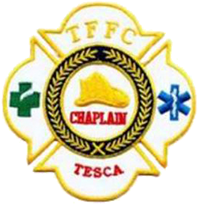First Responder Mental Health
Our state is blessed with amazing men and women who take the "Volunteer Spirit" to the next level with careers as first responders. The realities of the job have changed a lot in just a few years, and if you're going to make a career of it, you're probably not going to do it without getting some help. Please know, it's OK to not feel OK. Speak up. Say something... whether it's for yourself or someone next to you. It's a sign of strength to reach out for help. It's a sign of compassion to know the resources that are out there and offer them to a friend in need.
This page is designed to help you start the conversation, connect with experts in the field, and get back to what matters most to you.
Need Help Now?
If you reached this page, and you need help now because you're feeling like you might hurt yourself or try to end your life, please stop what you're doing and reach out for help. Your life is precious, purposeful, and powerful. You can call any of these resources or call someone you trust.
CopLine provides 24/7, CONFIDENTIAL services for callers who are dealing with various stressors encountered both on and off the job. Visit the link or call 1-800-COPLINE (800-267-5463).
Safe Call Now is a CONFIDENTIAL, comprehensive, 24-hour crisis referral service for all public safety employees, all emergency services personnel and their family members nationwide. Call 206-459-3020.
The 988 Suicide and Crisis Lifeline is available 24/7/365. You can call or text 988 and press 0 for a crisis counselor. You can also chat with 988lifeline.org.
Why it Matters
The days of suffering in silence are over. The days of "suck it up" or "be a man about it" are over. The job has changed, and the support available for the men and women in these roles has changed too. Now more than ever, leaders in first responder fields know that the most valuable resource isn't their apparatus or SWAT vehicle or infrastructure. It's the people who put on the uniform every day and volunteer to selflessly serve others.
Prevalence of Mental Health and Substance Use Disorders
Research backs up what you already know. First responders suffer from mental health and substance use disorders at a rate higher than civilians. First responders are at higher risk for depression, stress/PTSD, suicide, and substance use disorder, but there are things that can be done before, during, and after traumatic events that can support first responders. Here's a great document with some ideas.
If you've been in public service long enough, you probably know the signs already, but it can't hurt to take another look.
Signs of Burnout
Someone who's suffering from burnout can be easily frustrated, blames others, is always irritable. They might show signs of sadness, despression, apathy, or indifference. Their appearance and hygiene might suffer or they might self-isolate and disconnect from others.
Signs of Secondary Traumatic Stress
Someone suffering from secondary traumatic stress might excessively worry or fear about something bad happening and show physical signs of stress like a racing heart rate. They might be easily startled, or “on guard” all of the time or experience nightmares or recurrent thoughts about the traumatic situation
Have a concern? Take a screening and get the information you need to make a positive change.
The Power of Peer Support
A common barrier for first responders to access mental health or other supports is personal experience or shared experience from coworkers who reached out for help only to be disappointed. The lack of understanding or frame of reference can cause issues, but more and more resources are available to help from a peer perspective. These are groups run by former first responders working in connection with specially-trained therapists, or even sometimes therapists who have first responder experience themselves. They not only talk the talk but they've walked the walk, and that makes them able to connect in ways that can make all the difference.

Tennessee Public Safety Network
The Tennessee Public Safety Network is peer driven and clinically supported non-profit founded to respond to the increasing stress and trauma experienced by law enforcement officers, other public safety personnel, and their families. Their grant staff include a Program Director; Training Director; Four regional coordinators; and an administrative assistant. They also utilize team member volunteers who are sworn law enforcement officers from police agencies, sheriff department deputies and corrections personnel, along with some experienced fire and EMS personnel and licensed mental health professionals from across the State of Tennessee volunteer their services as requested. All volunteers have received specialized training in critical incident stress management, peer support, and confidentiality issues. Learn more about the services they offer in the video below and find contact information on their website at this link.

Tennessee Disaster Mental Health Strike Team
The Tennessee Disaster Mental Health Strike Team is a cadre of trained Chaplains, Mental Health, and Emergency Service Peer Professionals. They serve to provide Mental Health First Aid, Crisis Intervention, and initial mental health triage for citizens and emergency responders following major disasters and to provide a timely initial referral to Licensed Mental Health Care Professionals — including immediate emergency referrals when appropriate.
This team in no way displaces or replaces mental health services. However, this team is highly trained in mental health screening, mental health first aid, crisis intervention, and most importantly: effective referral. Using this Strike Team concept, the team is able to respond and refer to a mental health agency that is appropriate and available in a timely manner.
Learn more on their website at this link or call 800-792-1033.
For More Information
To learn more about this program, please contact:
April Hanners
Program Manager for Disaster Management and Suicide Prevention
Office of Crisis Services and Suicide Prevention
615-289-1780
april.m.hanners@tn.gov